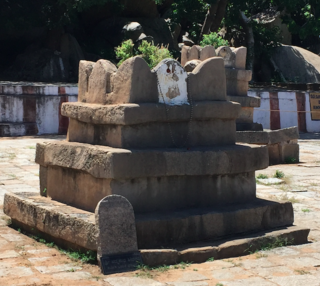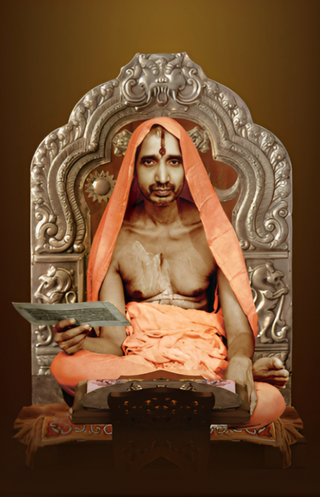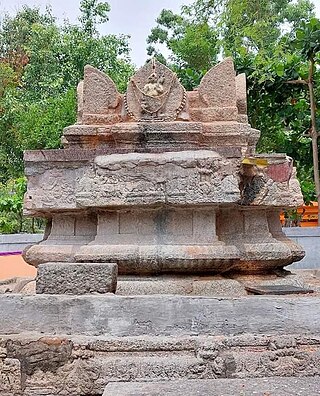Related Research Articles

Raghavendra Tirtha, also referred as Raghavendra Swami, was a Vaishnava scholar, theologian, and saint. He was also known as Sudha Parimalacharya. His diverse oeuvre include commentaries on the works of Madhva, Jayatirtha, and Vyasatirtha, interpretation of the Principal Upanishads from the standpoint of Dvaita and a treatise on Purva Mimamsa. He served as the pontiff of the matha at Kumbakonam from 1621 to 1671. Raghavendra Tirtha was also an accomplished player of the veena and he composed several songs under the name of Venu Gopala. His memorial at Mantralayam attracts lakhs of visitors every year.
Vyāsatīrtha, also called Vyasaraja or Chandrikacharya, was a Hindu philosopher, scholar, polemicist, commentator and poet belonging to the Madhwacharya's Dvaita order of Vedanta. As the rajaguru of Vijayanagara Empire, Vyasatirtha was at the forefront of a golden age in Dvaita which saw new developments in dialectical thought, growth of the Haridasa literature under bards like Purandara Dasa and Kanaka Dasa and an increased spread of Dvaita across the subcontinent. He himself composed many kīrtanas in Kannada and Sanskrit.
Jayatirtha, also known asTeekacharya, was a Hindu philosopher, dialectician, polemicist and the sixth pontiff of Madhvacharya Peetha from. He is considered to be one of the important seers in the history of Dvaita school of thought on account of his sound elucidations of the works of Madhvacharya. He structured the philosophical aspects of Dvaita and through his polemical works, elevating it to an equal footing with the contemporary schools of thought. Along with Madhva and Vyasatirtha, he is venerated as one of the three great spiritual sages, or munitraya of Dvaita. Jayatirtha is considered an incarnation of Indra with avesha of Adi Sesha in the Madhva Parampara.

Padmanabha Tirtha was an Indian Dvaita philosopher, scholar and the disciple of Madhvacharya. Ascending the pontifical seat after Madhvacharya, he served as the primary commentator of his works and in doing so, significantly elucidated Madhva's terse and laconic style of writing. His pioneering efforts in expanding upon the Dvaita texts to uncover the underlying metaphysical intricacies was taken forward by the 14th Century philosopher, Jayatirtha. Padmanabha is also credited with disseminating the philosophy of Dvaita outside the Tulunadu.

Satyapramoda Tirtha (IAST:Satyāpramoda Tīrtha; 1918 – 3 November 1997, was an Indian Hindu philosopher, spiritual leader, guru,, saint and the pontiff of Uttaradi Math, a math dedicated to Dvaita philosophy, which has a large following in southern India. He served as the 41st pontiff of Madhvacharya Peetha - Uttaradi Math from 2 February 1948 – 3 November 1997. He had established Jayateertha Vidyapeetha in Bangalore in 1989.
Satyadharma Tirtha, was a Hindu philosopher, scholar, theologian and saint belonging to the Dvaita order of Vedanta. He was the 28th pontiff of Uttaradi Math since Madhvacharya from 1797-1830.

Raghuttama Tirtha ; IAST:Śrī Raghūttama Tīrtha), was an Indian philosopher, scholar, theologian and saint. He was also known as Bhavabodhacharya. His oeuvre include commentaries on the works of Madhva and Jayatirtha. He served as the fourteenth pontiff of Madhvacharya Peetha - Uttaradi Math from 1557 to 1595, which he occupied for thirty-nine years. He is considered to be one of the important seers in the history of Dvaita school of thought. His shrine at Manampoondi attracts thousands of visitors every year.
Satyapriya Tirtha was an Indian Hindu philosopher, guru, scholar, yogi, mystic and the pontiff of Uttaradi Math, a math dedicated to Dvaita philosophy. He was the successor of Satyavijaya Tirtha and the 24th pontiff of Uttaradi Math from 1737—1744.

Vidyadhisha Tirtha, was an Indian philosopher, scholar, theologian, saint and dialectician. He served as the sixteenth pontiff of Uttaradi Math from 1619 to 1631. He is considered to be one of the important stalwarts in the history of Dvaita school of thought on account of his sound elucidations of the works of Madhvacharya, Jayatirtha and Vyasatirtha. He is also the most celebrated pontiff of Uttaradi Math after Padmanabha Tirtha, Jayatirtha and Raghuttama Tirtha.

Satyanatha Tirtha ; IAST:Śrī Satyanātha Tīrtha), also called Abhinava Vyasaraja, was a Hindu philosopher, scholar, theologian, logician and dialectician belonging to the Dvaita order of Vedanta. He served as the twentieth pontiff of Uttaradi Math from 1660 to 1673. He was a fiery and prolific writer and very ambitious of the glory of Dvaita Vedanta. He is considered to be one of the stalwarts in the history of the Dvaita school of thought, on account of his sound elucidations of the works of Madhvacharya, Jayatirtha and Vyasatirtha. Three of his polemically themed doxographical works are reminiscent of "Vyasatraya". His refutation work Abhinava Gada is a devastating criticism of Appayya's Madhvamathamukhamardhana. His independent treatise Abhinava Chandrika is considered a brilliant work relating to the Brahma Sūtras, being a commentary on Jayatirtha's Tattvaprakashika. His work Abhinava Tarka Tandava refuted the works of rival systems, especially those of Prabhākara of Mimamsa, Ramanuja's Visistadvaita, and Gangesha Upadhyaya, Raghunatha Siromani of the Nyaya school, on the same lines as Vyasatirtha's Tarka Tandava. Indologist B.N.K.Sharma wrote, "His energy and determination to crush out the rivalry of Monism is reflected even in the choice of the titles of some of his works, four of which go by the name "Paraśus" ".
Satyavara Tirtha was an Indian philosopher, scholar and the pontiff of Uttaradi Math, a math (mutt) dedicated to Dvaita philosophy. He was the successor of Satyasandha Tirtha and the 27th pontiff of Uttaradi Math since Madhvacharya, the chief proponent and the one who rejuvenated this Dvaita philosophy and served the pontificate from 1794 to 1797.
Satyabhinava Tirtha was a Hindu philosopher, scholar, theologian and saint. He served as the pontiff of Shri Uttaradi Math from 1673 to 1706. He was the 21st in succession from Madhvacharya. He is known for his great works Durghata Bhavadipa on Bhagavata Tatparya Nirnaya and Mahabharata Tatparya Nirnaya Vyakhyana, a commentary on Mahabharata Tatparya Nirnaya of Madhva.

Satyadhyana Tirtha was an Indian Hindu philosopher, scholar, yogi, mystic, theologian and saint. He was the 38th pontiff of Uttaradi Math and served the pontificate from 1911-1942. He was considered most active and zealous pontiffs of 20th century. He was an untiring propagandist, the best debater of his days and almost a terror to his adversaries in philosophical polemics. It was at his initiative and inspiration that a splendid Marathi translation of Madhva's Brahmasutra Bhashya, with the Tatvaprakashika of Jayatirtha was published for the benefit of a large number of followers of Madhvacharya in Maharashtra. He made extensive tours all over India, held disputations and published polemical tracts and pamphlets in many languages in North and South India for free distribution. He started, Sriman Madhva Siddhanta Abhivruddhikarini Sabha around 1905-06 and registered in 1930 to promote the study of Sanskrit literature and philosophy, particularly the study of Dvaita Philosophy, to hold meetings and conferences of Madhva scholars.
Satyavrata Tirtha was a Hindu philosopher, yogi, mystic, scholar and saint. He served as the pontiff of Shri Uttaradi Math from 1635–1638. He was the 18th in succession from Madhvacharya. Satyavrata Tirtha ruled the pontificate with a remarkable distinction. His life was a saga of supreme spiritual achievements. He is a yogi of remarkable spiritual powers and a philosopher of wide fame.
Vedesha Tirtha, was an Indian Hindu scholar and theologian in the Dvaita Vedānta tradition. He was the disciple of Raghuttama Tirtha, and is the most celebrated name in the annals of the Dvaita Vedanta. He is a Bidi-Sanyasi and not pontiff of any matha (monastery).
Bidarahalli Srinivasa Tirtha was an Indian Hindu scholar and theologian in the Dvaita Vedānta tradition. He is a prolific glossator of the early 17th century. He is the follower of Uttaradi Math and the disciple of Yadupati. According to tradition, Raghavendra Tirtha conferred on him the ascetic title of "Tirtha" by way of appreciation of his learning and contributions.
Bidarahalli Yadupati Acharya was an Indian Hindu scholar in the Dvaita Vedānta tradition. He is the follower of Uttaradi Math and the disciple of Vedesa Tirtha.

Bhavani Narayanrao Krishnamurti Sharma, commonly known as B. N. K. Sharma or B. N. Krishnamurti Sharma, was an Indian writer, scholar, professor, and Indologist. Sharma was a professor and Head of the Department of Sanskrit in Ruparel College, Bombay from (1953–1969). Sharma was one of the foremost exponents of Madhvacharya's school of Dvaita Vedanta. B. N. K. Sharma learned the art of debates under Satyadhyana Tirtha of Uttaradi Math. Sharma travelled along with Satyadhyana Tirtha from, learned all philosophical knowledge from him and also used to rectify his doubts from Satyadhyana Tirtha.
Abhinava Chandrika is a Sanskrit work on Dvaita philosophy written by Satyanatha Tirtha. It is a lucid adaptation of the well-known commentary on Jayatirthas Tattvaprakāśikā, which is a commentary on Madhvacharya's Brahma-sutra bhashya. It runs to 12,600 granthas and is magnum opus of Satyanatha Tirtha.

Shri Satyavijaya Tirtha was an Indian Hindu philosopher, guru, and scholar. He was the successor of Satyapurna Tirtha and the 23rd pontiff of Uttaradi Math since Madhvacharya, the chief proponent and the one who rejuvenated this Dvaita philosophy and served the pontificate from 1726–1737.
References
- ↑ Dasgupta 1922, p. 60-61.
- ↑ Venkatachar 1964.
- 1 2 Potter 1995, p. 1545.
- ↑ Pandurangi 1992.
- 1 2 3 Sharma 2000, p. 250.
- ↑ Sharma 2000, p. 251.
- 1 2 Potter 1995, p. 1486.
- ↑ Potter 1995, p. 1471.
- ↑ Sharma 2000, p. 252.
- 1 2 Sharma 2000, p. 254.
- ↑ Potter 1995, p. 1481.
- ↑ Sharma 2000, p. 255.
- ↑ Potter 1995, p. 1513.
- ↑ Sharma 2000, p. 257.
- ↑ Rao 1943.
- 1 2 Sharma 2000, p. 258.